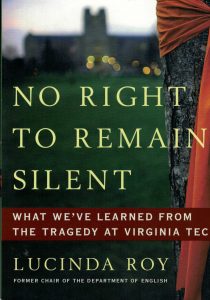Nonfiction

“Written in the present tense and filled with a poet’s mastery of tactile details, her description of [her] sessions [with Cho] is riveting….Calm analysis only heightens the urgency of Roy’s warning that fundamental problems in American culture need to be addressed lest similar tragedies occur.”—Kirkus
“In lucid and often engrossing prose, Roy paints a rich psychological portrait of a student from whom sadness emanated ‘like the smell of smoke from a nicotine addict.'”--Chronicle of Higher Education
“A fine work.” –The Economist
NO RIGHT TO REMAIN SILENT: WHAT WE’VE LEARNED FROM THE TRAGEDY AT VIRGINIA TECH:
Our education system is premised on the belief that students are willing to abide by the rules we establish and that they will seek help when they need it. Yet there are times when those who are mentally ill are not equipped to make a rational choice about such things as medication or counseling. At moments like these, who is morally obliged to intervene? The teacher, the parent, another student, a counselor, law enforcement? And what are the legal ramifications of intervention? In the United States, the legal options in the case of students who exhibit signs of being deeply troubled are less plentiful than we imagine. So we play a game of Russian roulette in education and in mental health, shuffling too many troubled young people through the system, convincing ourselves that no student would be crazy enough to load a gun and point it at someone’s head (NRTRS 8).
Frequently Asked Questions
Question: What prompted you to write a memoir about the Virginia Tech tragedy?
I wrote the book because we’re facing an unprecedented and dangerous situation in our schools and universities. Students everywhere are at risk unless we find ways to deal more effectively with this challenge.
The problem of emotionally disturbed students is more pervasive than people imagine. After the tragedy, I heard from hundreds of people who were facing similar problems with troubled students, trying to alert others to the fact that these young people needed help.
Question: What measures need to be taken across the country to prevent another tragedy like this from happening?
I think that we need to begin speaking across our differences, asking hard questions about what the threat really is and how we can tackle it while still preserving students’ civil rights. Student attacks on schools is such a hot-button issue, however—quite possibly the most explosive issue there is because it strikes at the heart of our culture, our future, and our affection—that it can be hard to have a measured dialogue about it. But it’s something we must do as a country.
This isn’t simply Virginia Tech’s problem, it’s one of America’s greatest challenges, and all kinds of difficult questions accompany it. How can you predict and thus prevent a catastrophic attack on a school by a student? What indicators are there to let you know that something could be seriously wrong? What kind of intervention is possible? If we are required to monitor student writing and behavior, how can we protect their civil rights and freedom of speech at the same time? If we don’t have long-term treatment options (and often we don’t because psychiatric beds at public facilities have been dramatically reduced), is it possible to respond effectively to students in desperate need of intervention? And what can we learn from past attacks on schools?
We need to have a sustained, thoughtful dialogue, but we can’t settle simply for rhetoric. We have to implement substantive reform in the areas of education, mental health, and campus security. We also have to take a hard look at things like teacher training, media violence, the role of parents, and gun accessibility.
